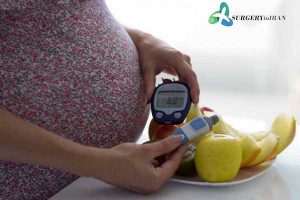Nutrition during pregnancy
Pregnancy is one of the most beautiful gifts given by God and one of the sweetest experiences of a woman during her lifetime, which must be taken very consciously to double her pleasure. Pregnancy usually lasts 280 days or 40 weeks and the body as a whole undergoes certain changes during this period. Changes that can be both physical and internal and hormonal. Nutrition becomes very important during this period, and according to the old sayings, the type of diet should be suitable for two people. Every food that a mother eats affects both her health and the health of the fetus. The mother should follow the path of comfort with the advice of a nutritionist until delivery.
learn more about Nutrition during pregnancy
- Food during this period can be divided into two categories
- Macronutrients include carbohydrates, proteins and fats
- Sugar consumption rules
- Allowable weight gain calculation amount
Food during this period can be divided into two categories:
– Micronutrients that include vitamins and minerals.
This group requires a smaller amount per day than macronutrients, and the human body is not able to make many of them. As a result, the diet should be adjusted in such a way that micronutrients are not forgotten during pregnancy. They play a significant role in the functioning of the immune and metabolic systems, and the brain and nervous system.
Minerals: The most important minerals needed during pregnancy are magnesium, zinc, copper and iron.
Magnesium: It is mostly found in dried fruits, legumes and oil seeds, as well as in fish, spinach and bananas.
Zinc: Zinc is abundant in fish and meat, especially liver, and plays an important role in the growth of the fetus.
Iron: provides tissue and the role that causes anemia. Fruits such as apricots, figs, peaches, as well as meat, eggs, potatoes, rice and corn are rich sources of iron.
Vitamin C activates the absorption of iron in the body and unlike tea, which is usually said to be consumed after eating, it destroys the absorption of iron.
During pregnancy, iron is absorbed by the liver of the fetus and it does not need iron for a long time after birth, and on the contrary, mothers suffer from severe anemia and iron deficiency, and they must stop it quickly and start taking pills from the very beginning of pregnancy.
Copper: It is a small mineral in the body that helps to make red blood cells. And during pregnancy, it is effective in the formation of the heart and blood vessels of the fetus. Cooked lentils, roasted hazelnuts, sunflower seeds and cashews contain copper.
Vitamins: One of the most important vitamins during pregnancy is vitamin A and C.
Vitamin A is abundantly found in carrots, cauliflower, lettuce, okra, spinach, and peppers, and in fruits such as oranges and peaches.
Vitamin C is found in sour fruits such as tangerines, lemons, oranges, strawberries and tomatoes.
All pregnant women during their period, in addition to consuming as much as the above ingredients in the daily food basket, should start consuming multivitamin mineral capsules from the end of the fourth month, and sometimes these capsules also contain iron. Avoid arbitrary consumption.
Macronutrients include carbohydrates, proteins and fats
Carbohydrates: the best foods containing carbohydrates include bread, rice, beans and starches, which during pregnancy, the mother’s body needs 550 grams per day. Many carbohydrates are not suitable and have harm, but useful carbohydrates provide energy to the mother’s body, and if If they are not, they cause weakness and fatigue, and sometimes they become depressed during this period. Mothers who completely eliminate carbohydrates for fear of gaining weight face the risk of premature birth and premature babies
Proteins: They include all kinds of meat, dairy products, beans, eggs. It is very important to get enough protein during pregnancy, especially in the second and third trimesters, and if it is not provided enough for the body, it will cause weight loss, fatigue, and infection. You can get up to 70 grams per day
Fats: Some fats are useful and some of them are harmful to health. It is better to always know the difference between these two types of fat in order to know what prohibitions we have in eating them. Consuming useful fats, most of which are vegetable, during pregnancy is very necessary for the development of the brain and eyes of the fetus and causes the proper formation of the placenta, so removing fat during this period for fear of obesity is a very wrong thing that some women do without consulting their doctor. They give. In the diet of a pregnant mother, there should be hazelnuts, olives, walnuts, vegetable butter, flour and low-fat foods. Avoid eating fatty and high-calorie foods and fast foods completely.
Sugar consumption rules:
During pregnancy, mothers temporarily suffer from diabetes, because during this period, the mother’s body is not able to produce insulin properly and cannot control the sugar intake of foods.
Pregnant women should prevent the occurrence of this dangerous disease by doing a series of appropriate exercises and observing dietary guidelines. This disease causes blurred vision, fatigue, excessive thirst, increased urination, nausea and weight loss, and makes the sweetness of this period bitter for the mother. In case of diabetes during this period, the doctor will determine the BMI of the body and provide you with the appropriate diet.
Points:
– Reduce the consumption of fats, especially saturated fats
– Use vegetable fats such as olive oil, sesame oil, canola oil, and nut oil in preparing all kinds of food.
– Use more grilled and boiled foods.
– Avoid sugar, sweets, chocolate, rice, pasta, soft drinks, fast foods and canned foods completely.
– Substitute vegetables, fruits, whole grains with fiber and low sugar in your main meals.
If all the conditions are observed, no problems will occur for the mother and the baby during this period, and this period will be passed safely
Allowable weight gain calculation amount
In the first days of pregnancy, the doctor divides your weight by your height to the power of 2 and measures the number he gets with a standard table whose value is constant all over the world. For example, if your number is between 16.5 and 18.5, you are underweight, and if your number is between 25 and 30, you are overweight. According to these figures, the specialist determines the amount of daily nutrition for you
Fluid intake
During pregnancy, the mother’s body needs more water due to increased sweating and frequent urination, and dehydration is very dangerous during this period. Be sure about the health of the water you consume and if in doubt, boil it.
In addition to water, use low-fat milk, low-salt butter, and Pasnourize. Prepare the juices at home and eat them. Be a little obsessed with drinking tea and coffee because of stomach irritation and sourness. If you are addicted to coffee, use decaffeinated coffees. Alcoholic drinks are strictly prohibited during this period. Consumption of carbonated drinks should be limited. Consuming a series of teas are also very harmful during this period
Medicines
It is forbidden to take any medicine during this period without consulting a doctor. And know that even simple drugs such as acetaminophen, cold pills and anti-allergic drugs may cause irreparable problems for your fetus during this period. You should also listen to the doctor’s advice about continuing to take certain medications before pregnancy
This is a very sweet and exciting time. During this period, try to raise your awareness as much as possible by reading and be sure to be in contact with health and mental health experts so that you don’t have a crisis during pregnancy.


















